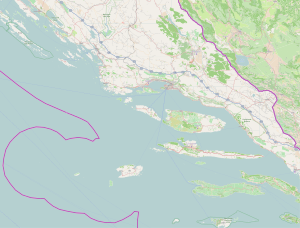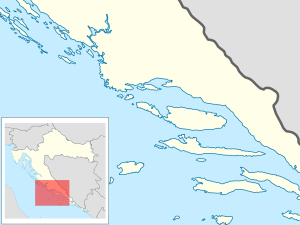Battle of the Dalmatian channels
| Battle of the Dalmatian Channels | |||||||
|---|---|---|---|---|---|---|---|
| Part of the Croatian War of Independence | |||||||
|
A location map of the central Dalmatia, and location of the area shown on the map of Croatia (inset, red) |
|||||||
|
|||||||
| Belligerents | |||||||
|
|
|
||||||
| Commanders and leaders | |||||||
| Sveto Letica |
Nikola Ercegović Ilija Brčič |
||||||
| Strength | |||||||
|
Coastal artillery Naval commandos |
2 frigates 4 missile boats 6 patrol boats 3 minesweepers |
||||||
| Casualties and losses | |||||||
| 2 killed | 1 patrol boat captured 2 minesweepers lost 1 minesweeper damaged 2 aircraft lost 22 killed |
||||||
| 2 civilians killed and 9 wounded 2 civilian ferries damaged |
|||||||
The Battle of the Dalmatian Channels was a three-day confrontation between three tactical groups of Yugoslav Navy ships and coastal artillery, and a detachment of naval commandos of the Croatian Navy fought on 14–16 November 1991 during the Croatian War of Independence. On 14 November, the commandos torpedoed the Mirna-class patrol boat PČ-176 Mukos close to the island of Brač in the Split Channel of the Adriatic Sea, prompting a Yugoslav naval bombardment of Brač and Šolta Island the same day. The drifting Mukos was salvaged by Croatian civilian boats and was beached at Nečujam bay.
The next day, a group of Yugoslav Navy vessels deployed to the Split Channel, organised into the Kaštela tactical group (TG) and bombarded the city of Split in retaliation for the loss of Mukos. In return, Croatian coastal artillery engaged the Kaštela TG. To draw off some of the artillery fire, the Yugoslav Navy deployed another group of vessels from the island of Vis, organised as the Vis TG, south of Šolta where the TG was engaged by more Croatian artillery. The Kaštela TG retreated east and joined with the Ploče TG consisting of three minesweepers.
On 16 November, the combined Yugoslav force sailed through the Korčula Channel—a strait separating the islands of Hvar and Korčula—to reach safety at the Yugoslav Navy base at Vis. The warships were then engaged by Croatian coastal artillery deployed on Korčula and the Pelješac Peninsula, losing two minesweepers to the artillery fire in the process.
The battle marked the last deployment of the Yugoslav Navy into one of the Dalmatian channels, the loosening of the naval blockade of the Croatian coast imposed in September and the largest Croatian Navy operation in the war. The Croatian Navy later towed the grounded Mukos to Šibenik, repaired the vessel and put her into service as OB-62 Šolta. During the battle, 22 Yugoslav Navy crewmen, two Croatian gunners and two civilian sailors in Split were killed. Thirty-three Yugoslav officers were charged in relation to the naval bombardment by Croatian authorities.
...
Wikipedia


